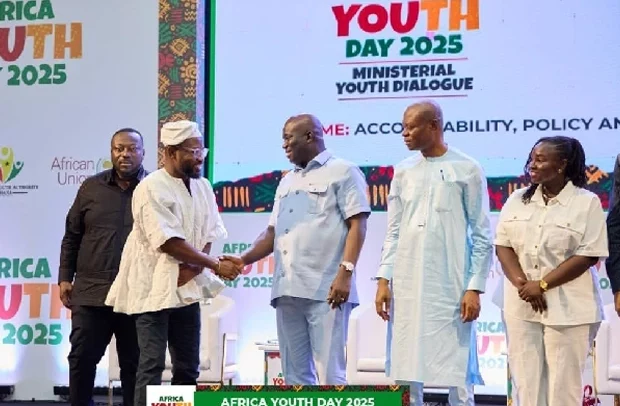Eric Opoku (M) shaking hands with one of the organisers
Ghana spends a staggering $3 billion every year on food imports despite its vast agricultural potential, Minister for Food and Agriculture, Eric Opoku, has disclosed.
He said the situation was unacceptable for a country endowed with fertile land and a youthful population capable of transforming the sector into an engine of economic growth.
Speaking at the Africa Youth Day 2025 Ministerial Youth Dialogue in Accra, Mr. Opoku said the country’s heavy food import bill, ranging from poultry to vegetables, undermines national development and poses a threat to long-term food security.
He revealed that the country imports about $400 million worth of tomatoes annually, even though the produce can be grown locally in abundance.
“Ghana spends $3 billion annually importing food. How do we justify importing tomatoes and poultry when we have arable land and young people ready to work? What is wrong with us?” he questioned and added, “We must rise to unlock our full agricultural potential.”
The Minister observed that the nation’s poultry production deficit remains alarming, noting that in 2022 the country produced only 15,000 metric tons out of a national consumption demand of 324,000 metric tons.
“This overdependence on imports weakens our domestic agriculture and exposes us to external shocks,” he said.
He stressed that reversing the trend requires urgent, innovative and youth-driven agricultural solutions.
With more than 500,000 young people entering the job market annually and only a fraction securing employment, Mr Opoku argued that agriculture presents the most assured pathway for mass job creation and economic stability.
“Africa produces nine million unemployed youth every year. If the situation is not addressed, the future is calamitous,” he warned, urging the continent to tap into its agricultural potential, which includes 60 percent of the world’s uncultivated arable land.
According to him, despite agriculture employing 38.3 percent of Ghana’s population, youth participation stands at only 5 percent, with the average farmer aged 45.
The Minister described this as a demographic imbalance that must be urgently corrected if the country is to achieve food sovereignty.
Mr. Opoku said government would launch a campaign to encourage mass participation in agriculture and make the sector more attractive to young people, particularly through value addition and agribusiness development.
He emphasised that Africa earns just 5 percent of the $130 billion global chocolate market because it exports raw cocoa rather than processing at scale.
“Every dollar invested in agriculture returns $23. Agriculture is not just about farming. It is a wealth creation tool,” he stated, calling for accountability and deliberate policies to drive youth-led agricultural transformation.
The dialogue brought together policymakers, development partners, youth leaders and civil society to explore solutions to unemployment and support Africa’s agricultural and economic future.
By Ernest Kofi Adu


